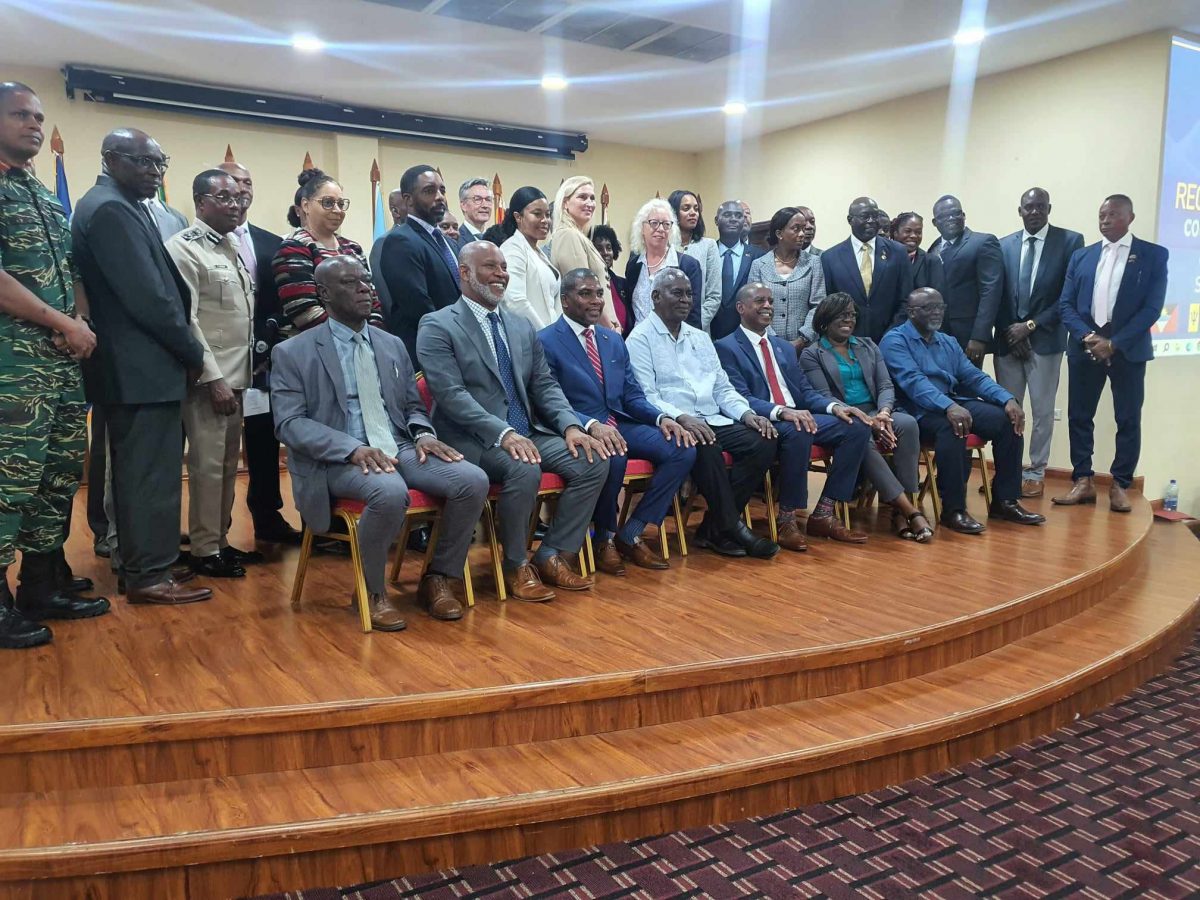The Caribbean’s Regional Security System (RSS) needs to consistently adapt to technological and other advancements to keep up with the evolving transnational crimes and other illicit activities.
It is for this reason that ensuring the region remains peaceful and stable that international partners on Friday promised their continued support.
“We are doing well, but have we upped our game? Have we become talented? Do we have, particularly, the new resources to respond to the greater challenges of transnational organized crime?” outgoing Chairman and Minister of Home Affairs Robeson Benn asked as he address-ed the RSS Council of Ministers’ Meeting held at the Ramada Princess Hotel, Providence, East Bank of Demerara.
He said that law enforcement and peace-keeping bodies have to match the ingenuity of the criminals in their fight against criminal enterprises. “The requirement for the total security system now is to be able to res-pond commensurate with the challenges which are out there; and which is why we continue to request; to leverage; to ask for; to beg even, I would say, so that we would get more help in respect of interdiction and prevention,” he said.
“We are upstream of the marketplaces where the drugs are used, [and] we’re downstream where the guns are used – which are used to support the problems in relation to drug trafficking and money laundering…,” he added.
For his part, RSS Exe-cutive Director, Commo-dore Errington Shurland, said that the body has led in the engagement with a number of partners and that they understood that robust anti-crime responses are needed. “We at the RSS Headquarters understand the importance of strategic robust counter transnational crime res-ponses and the protection of the maritime and cyberspaces of our member states,” he said.
For 2024 to 2025, the body plans to up its drive for global financing to provide opportunities for member states to test their national plans for countering transnational crimes. The RSS strategy, according to Shurland, has been simple as they want to strengthen interdiction and strengthen the member states’ capacity to leverage the contact framework to successfully conduct financial investigations prosecutions and assets recovery.
As it relates to assets recovery, he reported that so far some US$7.2 million has been seized, even as the RSS has also had the opportunity to advise the Caribbean Court of Justice (CCJ) on forfeiture.
He thanked especially the European Union, the United States, Canada, the United Kingdom and Commonwealth for its support over the years.
United States Ambassa-dor Nicole Theriot told the forum that her government promises to continue support for the RSS and nations to meet regional challenges and create a more peaceful space.
RSS collaborative successes, she said, are even more remarkable considering the new, complex security challenges that have emerged in their “shared neighbourhood” over the past year. She pointed out that from an assistance mission in Saint Lucia responding to increased gun violence, to the organisation’s preparations to support the Multinational Security Support Mission for Haiti, the RSS continues to serve as an anchor for security and stability in the region, as it has for more than four decades.
“Amid these challenges, the United States continues to be a proud, committed, and dedicated partner with the RSS, supporting the organisation and its member states in tackling the myriad regional issues that affect our collective security. This year, the U.S Drug Enforcement Administra-tion and the State Depart-ment’s Bureau of Inter-national Narcotics and Law Enforcement Affairs – INL – are working with RSS partners to establish a RSS-vetted unit. This unit will help member states combat transnational criminal organisations, a threat affecting the stability and security of not only the member states, but also the entire region. INL also continues to be a resolute sponsor of the RSS Air Wing, Digital Forensics Lab, and other initiatives,” the US Ambassador said.
“Together, we have collaborated to combat trafficking in arms, drug trafficking, human trafficking, enhance port security, develop climate resiliency, address cyber security, among many other critical issues facing the region – and the United States,” she added.
Last year the RSS coordinated with the U.S Department of Homeland Security’s Joint Task Force-East to execute a joint exercise – Operation Caribbean Combine – the first ever multi-threat, multi-domain counter-trafficking operation in the Eastern Caribbean. According to Theriot, the operation was a clear success, as there was “detection of over 14 separate instances of trafficking in our waters.”
The Ambassador also assured that Washington has a long-term plan to assist. “Our relationship is not just about tackling the issues of today, but it is also about meeting the challenges of tomorrow. Just this year, we brought a mobile training team from the Western Hemisphere Institute for Security Cooperation to the RSS, fostering exchanges, advancing professional development, and introducing new ideas for developing tomorrow’s leaders,” she said.
“… The United States stands with you as a willing partner in tackling regional challenges, shoulder-to- shoulder with the members of the RSS. The beauty of organisations like the RSS is that through collective action, we can achieve more than any of us can alone,” she declared.
Meanwhile, European Union Ambassador René van Nes, pointed out that the whole world is facing increasing challenges when it comes to safety and security and that there are more complex threats such as transnational organised crime, terrorism, piracy, environmental degradation, pandemic disease, and cyber-attacks. The constant battle with organized crime purchasing the newest technologies, is getting law enforcement trying to stay ahead of them.
“I am saying this to a Caribbean audience, but I could say exactly the same to any safety or security law and order audience in Europe. We face similar challenges, and what is happening here has an impact on the Caribbean region, the region at large and on Europe, as we are all connected in this globalized world. Therefore, it can’t come as a surprise that the Regional Security System and the European Union have been partners since 2008. The EU has been and will continue to support the region to improve the capacities of law enforcement and border security agencies to combat crime and terrorism in the maritime and land domains,” he said.
Regarding the support the EU is providing to the RSS, he said that they are currently supporting the strengthening of border security across the region.
Officers from each RSS member state and the Republic of Trinidad and Tobago will benefit over the period from training in areas including Polygraph Re-examining, Maritime Operations and Planning, Intelligence Analysis, and Counter-Terrorism.
Support also includes the funding of UNITY EXERCISE 2024 (UNEX’24), a full-scale field training exercise gathering defence and police forces and services and security agencies from the eight RSS Member States which will be held in Saint Lucia, April 3 to 13, and will involve French, Dutch, US, UK, and CA specialists.
The aim of UNEX’24 is to evaluate the application of command, control, communications, computers, and intelligence (C4I) and assess the interoperability of the RSS Combined Joint Task Force (CJTF), Countering Transnational Organized Crime (CTOC), and Countering Terrorism (CT) in Mass Crowd Events.
“There are many other EU security related programmes, bringing the combined expertise and knowledge from 27 EU Member States, to the Caribbean Region and will benefit the RSS as well…,” he said while listing EL PAcCTO; EU GIFP , AIRCOP and SEACOP.
The EU Ambassador noted that organised crime, drug trade and other illicit activities undermine the very foundation of societies the core principles of the EU: Human Rights, Democracy and Rule of Law.
“The EU is therefore committed to pursue these values in close cooperation with our Member States through its support to the RSS and our wider security related programmes,” he said.
The EU will soon start to review further areas for cooperation with the RSS beyond the current programme. “The EU is a solid partner of the RSS in the Caribbean region, and the EU has all intentions to continue this cooperation. We may not always be the fastest, but we are in for the long haul,” van Nes assured.
British High Commissioner Jane Miller stated that the UK values the long relationship it has had with the RSS and security officials across the Caribbean and congratulated the body for the work it has done across the region.
And like the US and the EU, she said that the RSS can expect continued support.
“We value this relationship, and we recognise the importance of collaboration and solidarity in providing a pathway for development in the region. The UK is committed to continuing our regional collaboration in Defence and Security to provide a collective security mechanism. This collaboration is so important as the modern operating environment is increasingly more complex and in which traditional threats are being replaced by multifaceted challenges,” she said.
CARICOM and the UK’s Wilton Park are to co-host a Dialogue for Ministers of National Security in May in Miami, Florida. “This meeting will inform action to progress last year’s Heads of Government declaration on illicit finance and anti-corruption, helping to shape a regional response,” she said.








